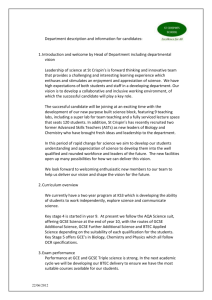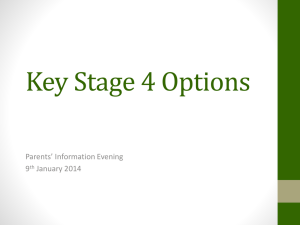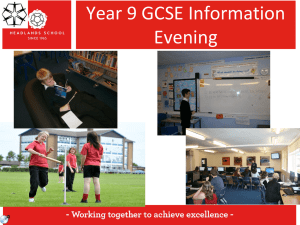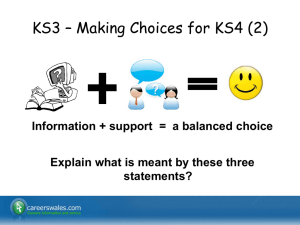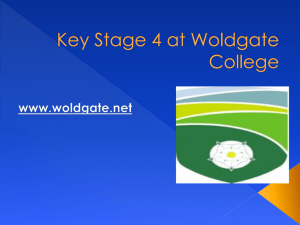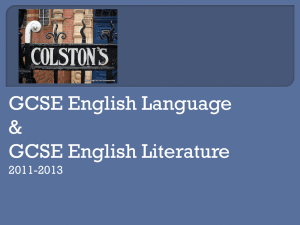Information for Parents.
advertisement
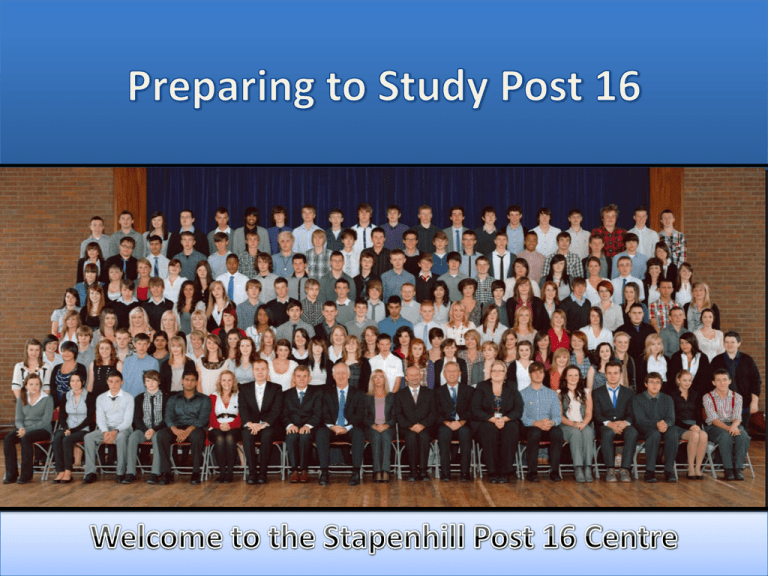
Differences between GCSE and Post 16 Education A brief introduction to the structure of Post 16 education What we expect from our students What you can expect from the Centre To explore ways to support achievement What are the differences between GCSEs and Post 16 qualifications? What do our Year 12 students say about Post 16 education? ‘The jump from GCSE to A Levels is big, so be prepared to work hard’ ‘Choose subject areas you are strongest in and enjoy the most, this is key to success’ ‘Make sure you do more work than you did at GCSE and that you are committed to your subjects’ Level 2 courses are a really good way to boost your GCSE grades, without doing ‘more of the same’ exams So what are the differences? • • • • • • • Greater independence A smaller range of subjects being studied Study periods Greater amount of out of school work More focus on independent enquiry Different assessment criteria and grades Not compulsory – students have chosen to study Post 16 The structure of Post 16 Education Level 2 • • • • • • 1 year courses 4 GCSEs Work experience Apprenticeships Employment Level 3 study Level 3 – A Levels Level 3 - BTECs • 2 year courses • AS leads to A2 • Advanced apprenticeships • Employment • Higher Education • 2 year courses • Can be combined with A Levels • Advanced apprenticeships • Employment • Higher Education The structure of Post 16 Education Level 2 Pathway – 4 Ds at GCSE Health and Social Care Engineering Business Studies Level 3 – Vocational BTEC Pathway – 5Cs or above at GCSE Sport (single) ICT (single and or double) Art (single) Public Services (single) Performing Arts (Double) Health and Social Care (double) Business Studies (single) All can be combined with A Levels Level 3 – A Level Pathway – 5 GCSEs A*- C plus a B grade in a continuation subject History Geography RE Psychology Sociology Politics Maths Further Maths Media English Literature Lit/Lang. French Chemistry Biology Physics PE Product Design The structure of Post 16 Education Year 2 Year 1 A2 2 modules A2 AS level Together they make one A level AS 2 modules The structure of Post 16 Education Two year courses •ICT (single and double) •Performing Arts Year 2 Year 1 Two year courses (with a half-way, part qualification) •Public Services •Health and Social Care •Art and Design •BTEC Sport What do we expect from our students? Both staff and students feel the characteristics below outline what should be expected of all Post 16 students at all times: • • • • Respectful and Positive Organised and Hardworking Committed and Focused Present and Punctual What do we expect from our students? Attendance • Registration (daily in year 12) and all lessons must be attended. • Minimum expected attendance to registration, lessons and any other agreed session is 95% • 95% attendance is the equivalent to ½ a day of absence per fortnight • 90% is the equivalent to 1 day of absence per fortnight • Research shows that students who have below 95% attendance achieve on average a grade below expectation Below 90% 9095% +95% What do we expect from our students? Dress Code • Smart ‘appropriate for business’ clothing • Black or dark trousers • Skirt of a suitable length • Shirt or smart blouse/top • Smart shoes/boots Below 90% 9095% +95% What can you expect from the Centre? Target Setting A B negative C D Student A Student B positive E Average GCSE Score Student C What can you expect from the Centre? Progress Information Progress is reported 3 times a year You will be updated on: a) Current attainment b) Work Ethic c) Likely end grade if student continues to work in the same manner 5th February – Progress evening with subject teachers What can you expect from the Centre? Pastoral Support • • • • • • Support-advice and guidance to keep students motivated Monitoring Mentoring Partnership with parents (Home/School links) A form tutor who is your, and the student’s first point of contact Care and support if things aren’t going right. What can you expect from the Centre? Enrichment Opportunities • • • • • • • • • Transition visit to Swadlincote Ski Centre Young Enterprise Post 16 Student Council Sports Teams Field visits for relevant subjects Transition visit after AS examinations Work Experience and Community Link Citizenship Education A wide range of Post 18 visits What can you expect from the Centre? Careers Guidance • • • • • • • Clear support, information and guidance will be given to all students at all stages of their Post 16 education. Students’ aspirations are encouraged through the provision of insight and guidance about opportunities post 18. Careers Café Pastoral Support HE guidance Futures Week Availability of fortnightly SYPS appointments What can you expect from the Centre? Financial Support – 16-19 Bursary • • Students entitled to received FSM will receive a sum of money three times a year, equivalent to £10 per week Three times a year all other students who qualify will be able to access this fund to provide support for a wide range of needs including: trips, additional study materials, clothes for Post 16 study Please take away and complete the FSM form if you feel that your child will be able to benefit from this fund How can you help and support this next stage of education? • • • • • • Access the preparing to study Power Points on our website: http://www.stapenhillpsc.staffs.sch.uk/ Read the preparing to study guides for a range of information about Post 16 study Keep contact information and phone numbers upto-date Consider the need of the student to have a part time job – 10 hours of part time work can have disastrous consequences with regards to Post 16 achievement Please do not book family holidays in term time – they will not be authorised Phone us by 9:15am if the student is ill Key Dates for your dairy Date Event 23rd August GCSE results day. Robert Sutton and Paulet students see their Head of 6th Form before leaving for a quick Progression Interview 3rd September 1.30 pm - Progression Interviews for any student unable to attend on GCSE results day, and those coming to us from other schools 4th September Enrolment day at the centre (appointments times TBC) 5th September 9.00 am – Study Skills Induction 6th September Lessons begin – register at the schools at 8.30 am 28th September Deadline date for subject changes October Progress assessment data to be sent to parents/carers Any questions?



